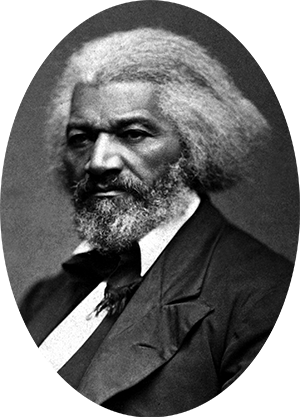Frederick Douglass (1818-1895)
Page Content
 Frederick Douglass, ca. 1879. (Courtesy of National Archives)
Frederick Douglass, ca. 1879. (Courtesy of National Archives)

"A man's rights rest in three boxes. The ballot box, jury box and the cartridge box. Let no man be kept from the ballot box because of his color. Let no woman be kept from the ballot box because of her sex."
Douglass freed himself from slavery, becoming a national leader for the causes of equality, suffrage, and the abolition of slavery. He was a famously skilled orator, and published a newspaper to combat slavery and racism: The Northern Star. Douglass was the only African American person present at the 1848 Seneca Falls Convention, and one of only 32 men to sign the Declaration of Sentiments. He used his newspaper to press the issue further, making it a platform from which he detailed the harmony between abolitionism and feminism.
After the Civil War, Douglass worked as a statesman, holding positions in the federal government. In 1866, Douglass founded the American Equal Rights Association with Elizabeth Cady Stanton and Susan B. Anthony to push for universal suffrage. Their relationship soon soured in debates over the 15th Amendment which would guarantee male voting rights regardless of race. Stanton and Anthony did not feel the amendment went far enough and should include women. Douglass disagreed, believing that linking woman suffrage to Black male suffrage in the same bill would doom both causes. Douglass celebrated the amendment’s passage as an incremental victory, and continued to agitate for women’s rights for the rest of his life.
Next: Abigail Scott Duniway >